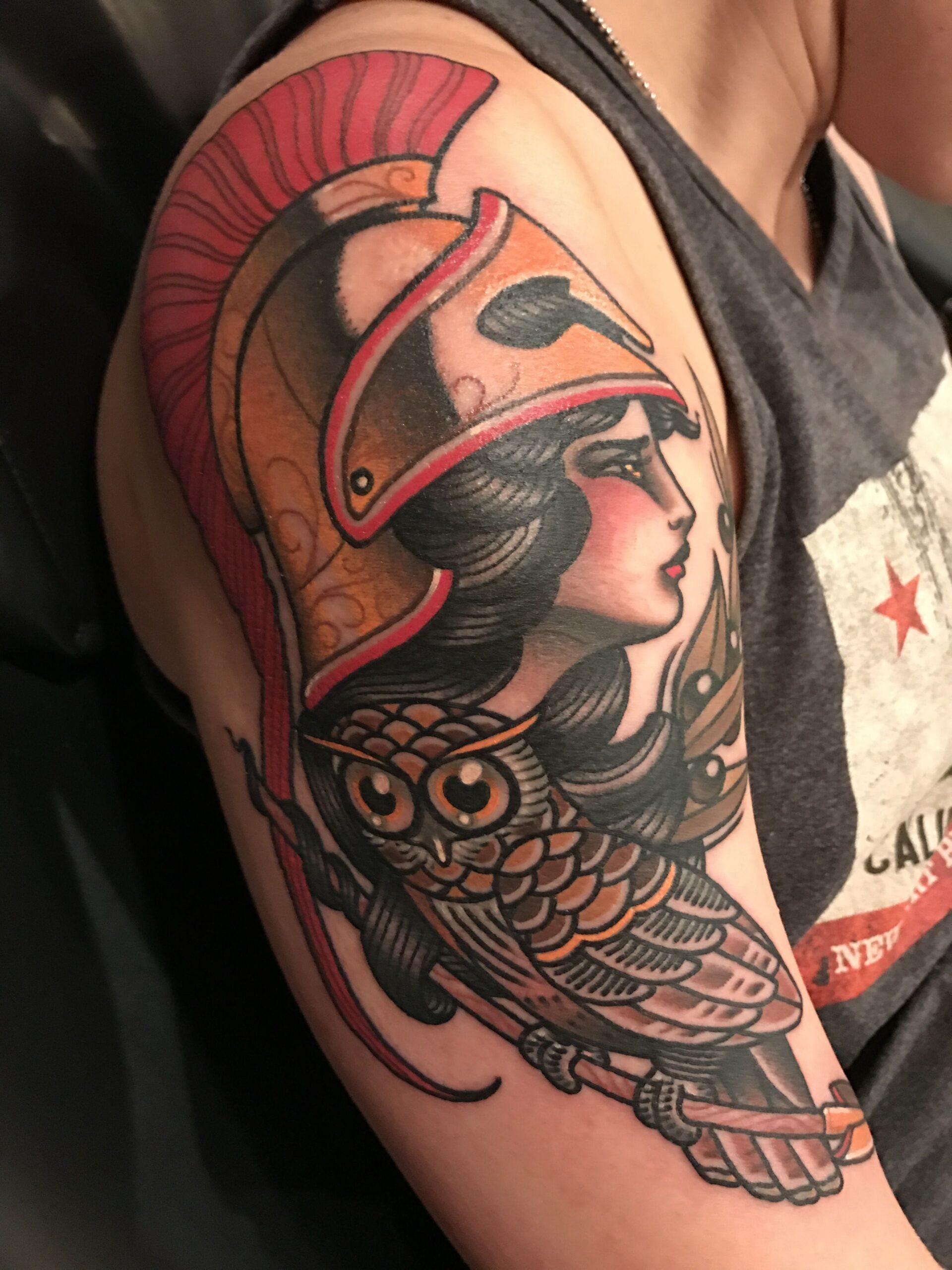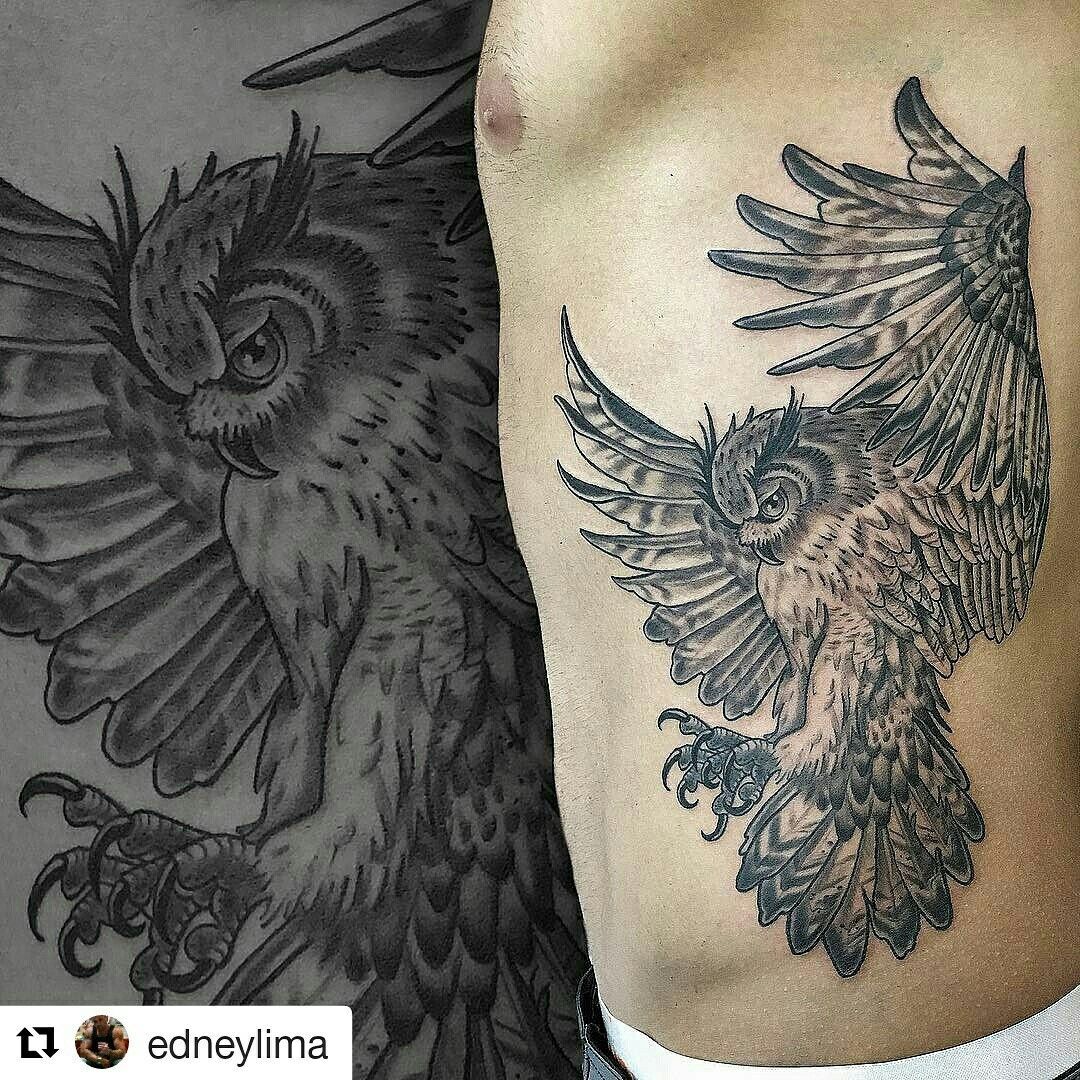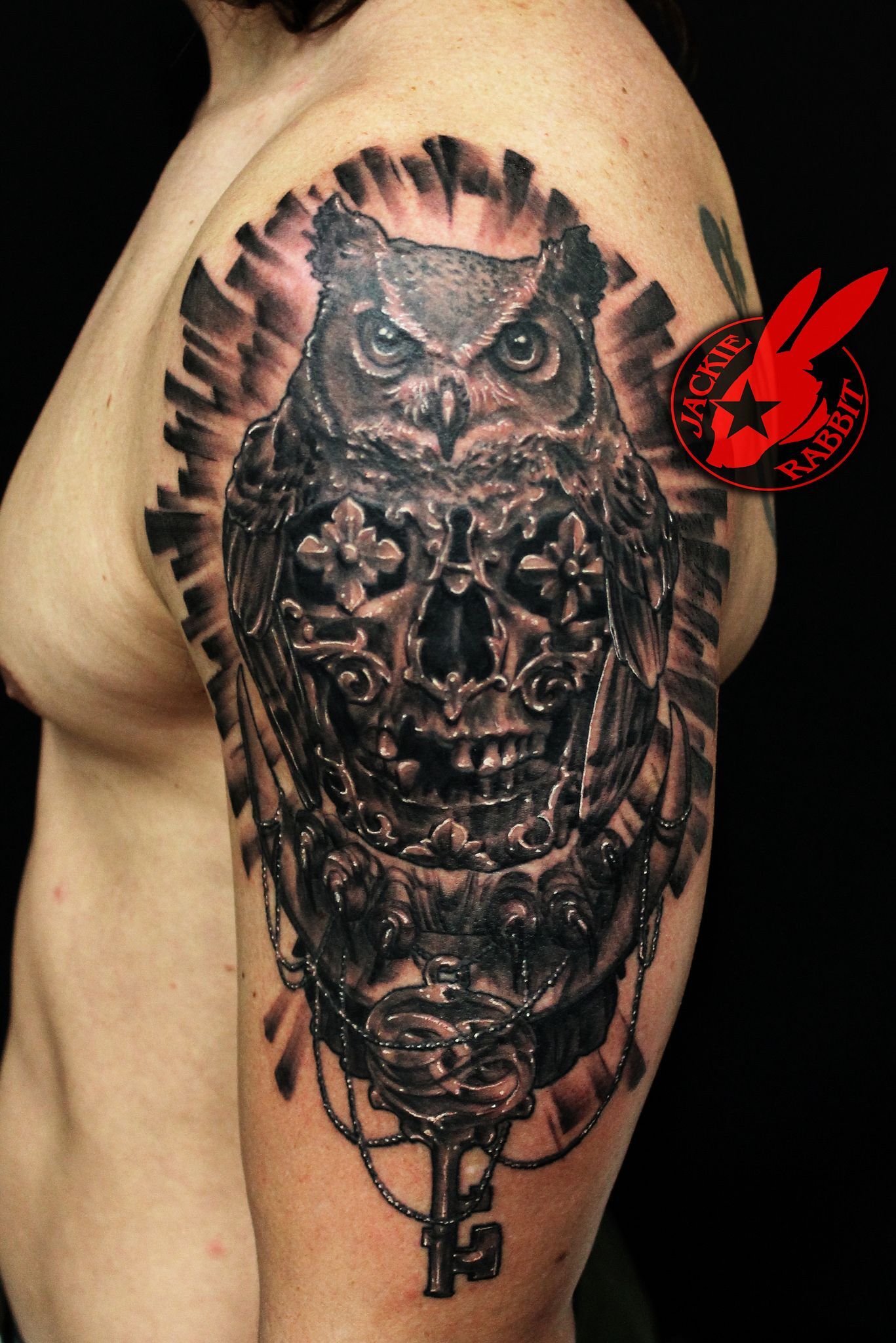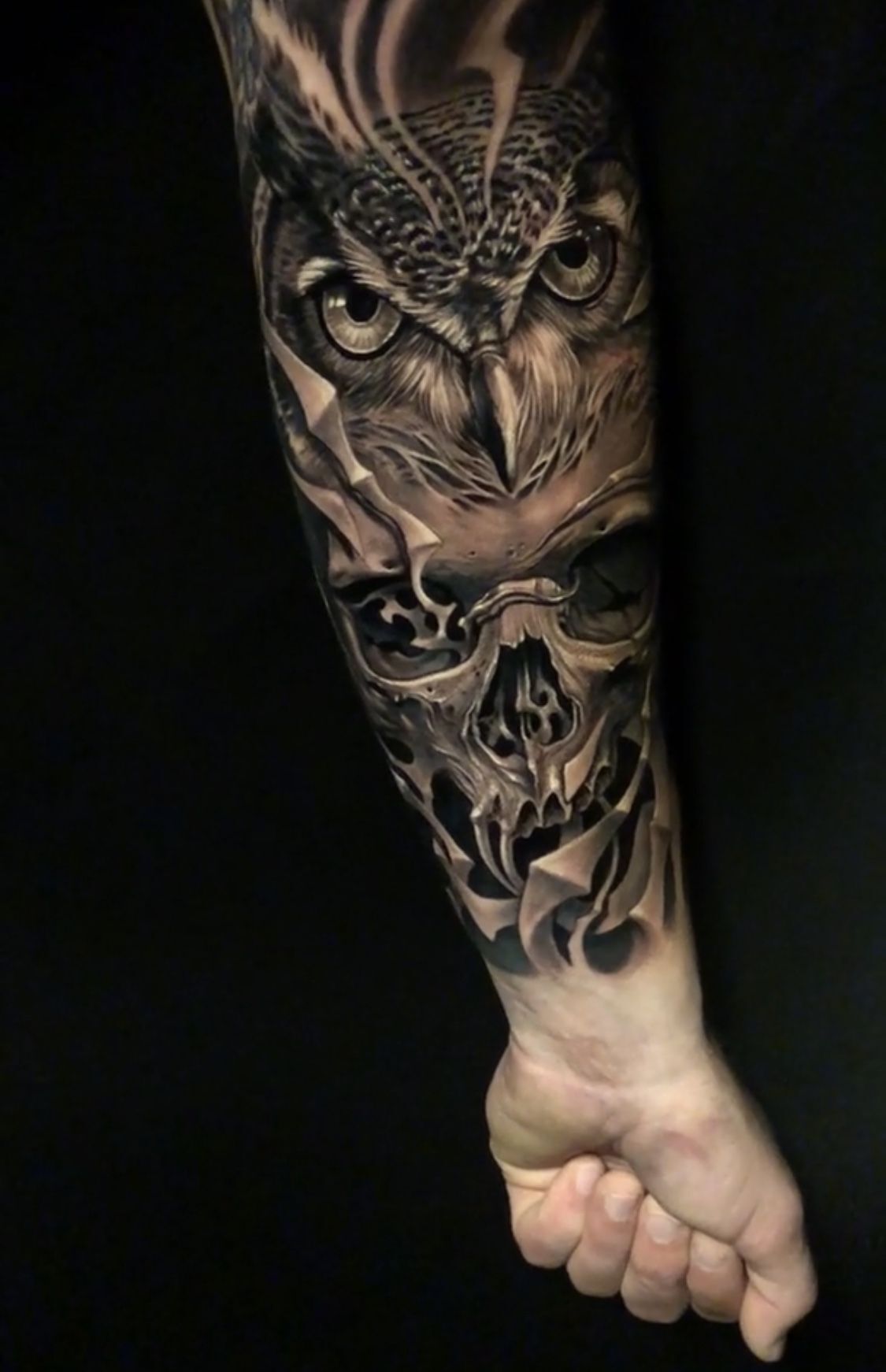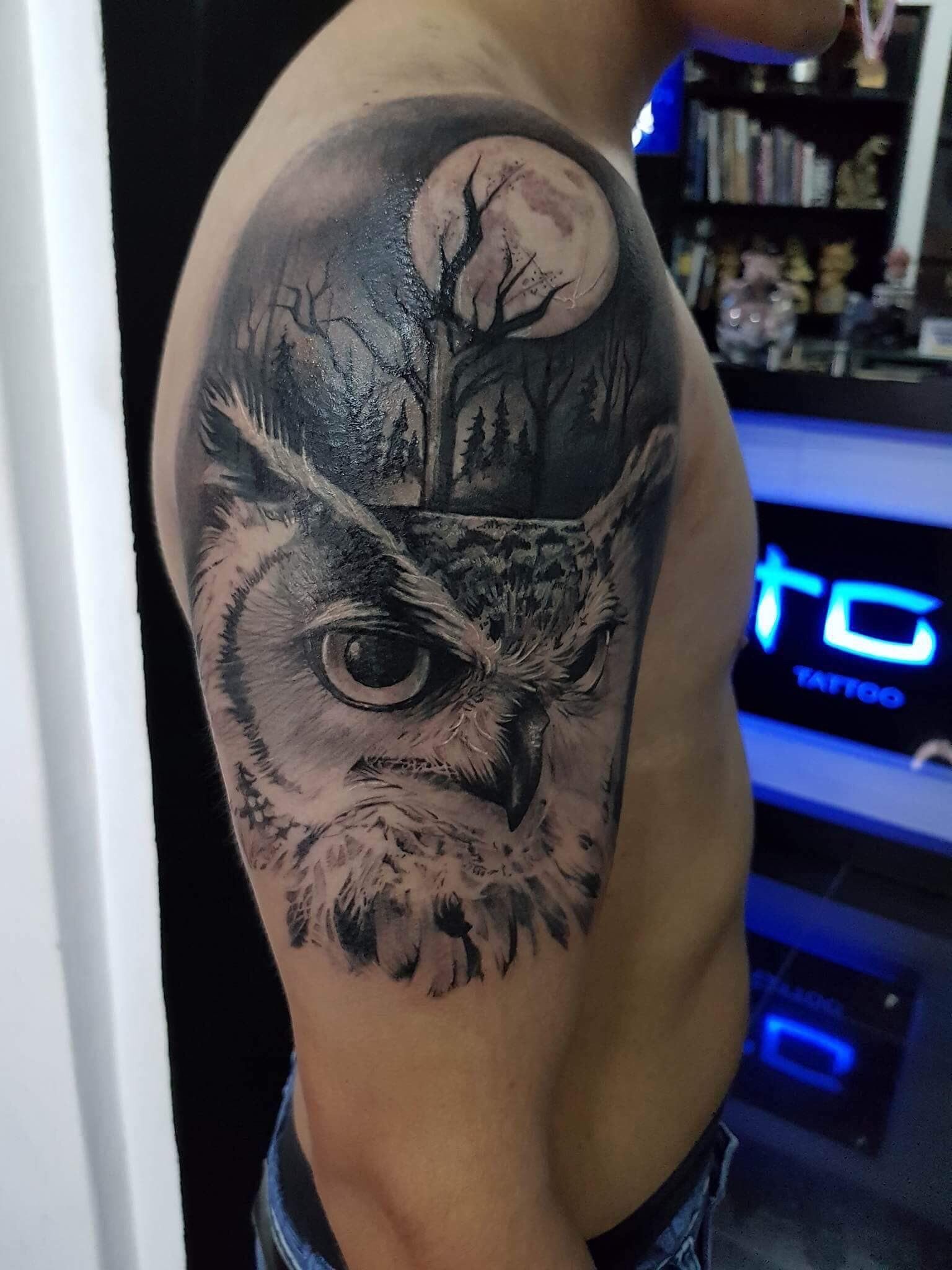Owls have been a popular subject in various cultures for centuries, appearing in art, literature, and mythology. Their unique appearance and special abilities make them attractive for tattoos. This article will explore the meaning behind owl tattoos and the top five rated designs. We will also discuss the history and origin of the owl tattoo and who might want to consider getting one.
Are you only interested in tattoo designs and want to skip the educational part?
No problem, we got you covered! Click HERE to get inspired.
What Do Owls Symbolize in different cultures?
The symbolism of owls varies widely across different cultures, often bearing associations with the creature's distinct characteristics. In Western cultures, notably ancient Greece, owls are revered as symbols of wisdom and knowledge, with their representation linked to Athena, the goddess of wisdom. Conversely, in Roman culture, the owl's nocturnal nature associated it with ill omen and death.
In some Native American traditions, the owl is considered a totem of prophecy and wisdom, and sometimes, an announcer of death. Conversely, in certain African and Australian Aboriginal cultures, owls are seen as spirits of the dead and harbingers of bad news.
In Asia, owls bear different connotations. In India, the owl is sacred to the goddess of wealth, Lakshmi, symbolizing prosperity, while in Japan, owls represent good fortune and protection from suffering.
Thus, owls, while universally recognized in folklore, carry diverse symbolisms ranging from wisdom, prophecy, and good fortune, to omens of death and misfortune, reflective of the varied cultural contexts in which they are perceived.
What is the meaning behind owl tattoos?
Owl tattoos often carry rich symbolism and meaning, drawing from the various associations of owls in different cultures. Primarily, they are seen as representations of wisdom and knowledge, echoing the owl's classical association with the Greek goddess Athena.
The nocturnal nature of owls can also represent mystery and the ability to navigate through the darkness, symbolizing intuition and the power to see things that may be hidden to others.
As a tattoo, an owl can represent personal growth, change, or transformation, since owls are often viewed as symbols of transition due to their emergence at dusk. Some individuals may choose owl tattoos as emblems of freedom and independence as well, given the owl's solitary lifestyle.
However, in some cultures, an owl tattoo may be viewed as a harbinger of death or misfortune. Thus, the meaning behind owl tattoos can vary greatly depending on personal interpretations and cultural influences.
best owl tattoo ideas and their meanings
Owl tattoos are among the most popular designs thanks to their deep symbolic meaning and intriguing aesthetics. These designs are as varied and individual as the wearers themselves, with each interpretation revealing unique insights into the wearer's identity or personal journey. From the wisdom-associated Greek goddess Athena's owl to the mystical imagery of an owl against the moon, each design carries a specific symbolism. Here are five top-rated owl tattoo ideas and their potential meanings, showcasing the diverse interpretations of this nocturnal creature.
Traditional Athena's Owl Tattoo
This design pays homage to the Greek goddess Athena's companion, a little owl that symbolized wisdom and knowledge. It's a fitting choice for individuals who identify with these traits or seek to embody them.
Flying Owl Tattoo
A flying owl tattoo can symbolize freedom and independence. It's a powerful representation of the ability to navigate through life freely, symbolizing a free spirit and the courage to chart one's own path.
Owl with a Key Tattoo
An owl holding a key in its talons is a compelling design. The key can represent the unlocking of hidden wisdom or potential, aligning with the owl's association with intuition and the ability to see what others cannot.
Owl and Skull Tattoo
A more ominous design, the owl with a skull integrates the owl's symbolism of death or transition. It may be chosen by individuals going through significant life changes, or those who embrace the darker, more mysterious aspects of life.
Owl and Moon Tattoo
A design featuring an owl with the moon often represents the mystery of the night and the realm of the subconscious. It's a popular choice for those fascinated by the enigma of the nocturnal world, or those who see themselves as intuitive and insightful.
Who should get an owl tattoo?
An owl tattoo can be an excellent choice for a broad range of individuals. Those who value wisdom, knowledge, and intellectual pursuits may find the owl's association with the Greek goddess Athena appealing. People who identify as night owls or who appreciate the mystery and allure of the night may also resonate with the owl's nocturnal nature. Similarly, individuals who value intuition and insight, symbolized by the owl's ability to see in the dark, could be drawn to this design.
If you're going through a significant transition or personal transformation, an owl tattoo might also be suitable, as owls can symbolize change and the ability to navigate through challenging times. Lastly, those who cherish their independence and freedom, much like the solitary owl, may also find this symbol meaningful.
It's important to remember, though, that tattoos are very personal. The ultimate decision about whether an owl tattoo is right for you should be based on your personal connection to the symbolism and aesthetics of the design.
General Breakdown Of Tattoo Pain Levels On Different Body Parts
Here is a breakdown of the different tattoo pain levels:
- Low: This level of pain is generally described as a mild discomfort or tickling sensation. It is similar to the sensation of getting a light scratch or scrape.
- Moderate: This level of pain is generally described as a moderate discomfort or aching sensation. It is similar to the sensation of getting a deep scratch or scrape or being pinched.
- High: This level of pain is generally described as a strong discomfort or throbbing sensation. It is similar to the sensation of getting a burn or being stung by a bee.
It's important to note that pain tolerance is highly individual and can vary greatly from person to person. Some people may find certain body parts more or less painful than others, and the same body part can be more or less painful for different people. Additionally, the level of pain can be affected by factors such as the size and location of the tattoo, the skill of the tattoo artist, and the individual's own pain threshold.
Tattoo placement pain level chart
Body Part | Pain Level | Explanation |
Forehead | Low | The forehead has few nerve endings, so it is not a particularly painful area. |
Eyebrows | Low | The eyebrows have few nerve endings, so the pain level is relatively low. |
Ear | Low | The ear is a relatively thin and fleshy area, so the pain level is low. |
Nostril | Low | The nostril is a small area with thin skin, so the pain level is low. |
Lip | Low to Moderate | The lip has more nerve endings than some other areas, so it may be slightly more painful. |
Cheek | Low to Moderate | The cheek has a moderate amount of nerve endings, so it may be slightly more painful. |
Moderate | The neck has a moderate amount of nerve endings, so it may be slightly more painful. | |
Moderate to High | The chest has a high concentration of nerve endings, so it can be quite painful. | |
Abdomen | High | The abdomen has a high concentration of nerve endings, so it can be quite painful. |
Back | High | The back has a high concentration of nerve endings, so it can be quite painful. |
Shoulders | High | The shoulders have a high concentration of nerve endings, so they can be quite painful. |
Upper Arms | Moderate to High | The upper arms have a moderate to high concentration of nerve endings, so they can be somewhat painful. |
Elbows | High | The elbows have a high concentration of nerve endings, so they can be quite painful. |
Forearms | Moderate | The forearms have a moderate concentration of nerve endings, so they are not as painful as some other areas. |
Hands | High | The hands have a high concentration of nerve endings, so they can be quite painful. |
Lower Arms | Low to Moderate | The lower arms have a lower concentration of nerve endings, so they are not as painful as some other areas. |
Wrists | Low | The wrists have a low concentration of nerve endings, so they are not very painful. |
Lower Back | High | The lower back has a high concentration of nerve endings, so it can be quite painful. |
Buttocks | High | The buttocks have a high concentration of nerve endings, so they can be quite painful. |
Thighs | High | The thighs have a high concentration of nerve endings, so they can be quite painful. |
Knees | High | The knees have a high concentration of nerve endings, so they can be quite painful. |
Calves | Low to Moderate | The calves have a low to moderate concentration of nerve endings, so they are not as painful as some other areas. |
Ankles | Low | The ankles have a low concentration of nerve endings, so they are not very painful. |
Tattoo aftercare tips
Before getting a tattoo:
Choose a reputable tattoo artist and parlor. Research the artist's portfolio and read reviews from previous clients.
Consult with the artist about the design and placement of the tattoo.
Make sure you are in good health. If you have any medical conditions or are taking any medications that may affect your ability to heal, be sure to let your tattoo artist know.
Consider using a numbing cream to reduce pain during the tattooing process. These creams contain a numbing agent (such as lidocaine) that can be applied to the skin before the tattoo is done. It's important to follow the instructions on the numbing cream and to only use it as directed.
Avoid alcohol, caffeine, and other substances that can thin your blood for at least 24 hours before getting a tattoo.
Eat a healthy meal before your tattoo session to ensure that your blood sugar is stable.
Wear loose, comfortable clothing that allows easy access to the area being tattooed.
After getting a tattoo:
Follow the aftercare instructions provided by your tattoo artist. These may include:
Keeping the tattoo clean and covered with a bandage for the first few hours after getting tattooed.
Washing the tattoo with lukewarm water and a mild soap (such as unscented, antimicrobial soap) and patting it dry with a clean towel.
Applying a thin layer of tattoo ointment or lotion (such as A&D or Aquaphor) to the tattoo and covering it with a clean bandage or wrap.
Repeating this process for the first few days, or until the tattoo has fully scabbed over.
Avoid soaking the tattoo in water for the first week, such as in a bath or pool.
Avoid picking or scratching at the scabs, as this can cause the tattoo to fade or become infected.
Avoid exposure to direct sunlight or tanning beds for at least 2-4 weeks.
If you experience any redness, swelling, or unusual discharge, contact your tattoo artist or a healthcare professional.
Overall, it's important to keep your tattoo clean and moisturized during the healing process to ensure that it heals properly and looks its best. Using a numbing cream can help reduce pain during the tattooing process, but it's important to use it as directed and to follow all aftercare instructions to ensure that your tattoo heals properly.
People Also Ask:
What are the most common owl tattoo designs?
Traditional, watercolor, realistic, owl, and moon are the most common owl tattoo designs.
Can owl tattoos be a symbol of bad luck?
It depends on the culture and personal beliefs. In some cultures, owls are seen as symbols of bad luck, while in others, they are seen as symbols of good luck and protection.
How long does an owl tattoo take to heal?
Typically, an owl tattoo takes around two to four weeks to fully heal.
What are the most popular placement options for an owl tattoo?
An owl tattoo's most popular placement options include the upper arm, back, thigh, and ribcage.
What is the cost of an owl tattoo?
The cost of an owl tattoo can vary depending on the size, design, and location of the tattoo. On average, a small owl tattoo can cost between $50 to $200, while an extensive or more detailed design can cost upwards of $500.
Watch A video of a Owl tattoo done by a pro
200+ Owl tattoo Ideas to get inspired from
Final thoughts
Owl tattoos are popular for those who want to express their connection to nature, their appreciation of wisdom and knowledge, or their love of mystery and freedom. Whether you choose a traditional design, a watercolor abstract, or a realistic depiction, an owl tattoo can hold a special meaning for anyone who appreciates this fascinating bird.

